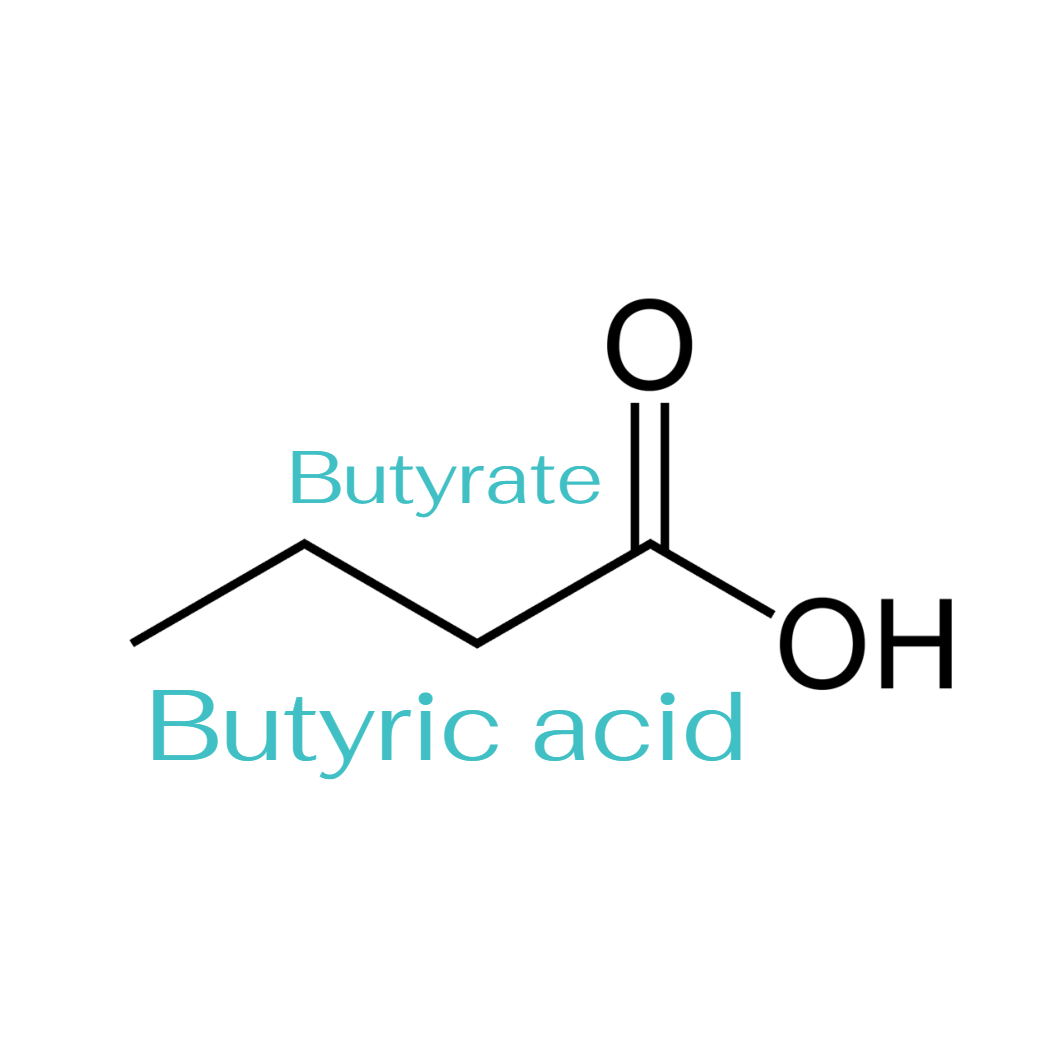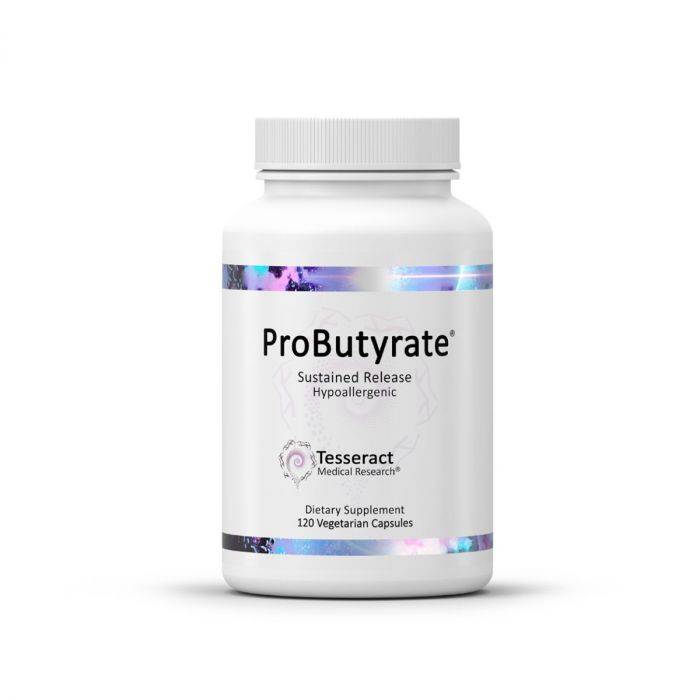Butyrate – Butyric acid

Butyrate is an essential source of energy for the intestinal epithelium. It plays a crucial role in regulating the proliferation and differentiation of epithelial cells, protecting immune function and mucous membranes. Butyrate has antitumor activity and antimicrobial effect against the most enteric pathogens, thereby significantly improving the composition of gut microflora.
TesserAct ProButyrate
For gut cell repair, bacteria controll and histamine balance
RIGHT IN THE GUT HEALTH: ProButyrate® is a supplement using the purest possible Butanoic acid, unlike other Butyric supplements that use Butyric salt. Butyric acid is a short-chain fatty acid believed in providing optimal benefit to the gastrointestinal tract
ABSORBABLE EFFICIENCY: ProButyrate® uses Tesseract’s technology to offer higher bio-availability than many Butyric acid supplement capsules. Butyric acid has been scientifically shown to support and promote the health of the GI tract and microbiome.
Butyric acid is a short-chain fatty acid (mainly Butyrate, acetate, and propionate) highly produced in the gut by bacterial fermentation of undigested carbohydrates such as dietary fiber.
Indigestible carbohydrates (prebiotics) increase colonic butyrate concentration, which is thought to be responsible for its beneficial effects. In inflammation caused by oxidative stress, damage to the integrity of cell-cell connections and an increase in cell permeability may occur, depending on the extent and duration of the oxidative effect.
The therapeutic value of the protective n-butyrate improves the intestinal epithelium’s barrier function, maintains a healthy intestinal flora, and promotes the regeneration of intestinal epithelial cells.
Butyric acid treatment
Decrease in cell layer resistance induced by acute oxidative stress after low-dose butyrate treatment decreased, indicating that the role of a mechanical barrier is strengthened. Based on experimental results, the composition of the intestinal flora has become favorable.
The number of beneficial lactic acid bacteria and the amount of L-lactic acid they produce in the small intestine also increased. Butyrate affects the coliform bacteria; it can also be used effectively to prevent and overcome the development of infectious conditions in the intestinal tract.
Butyrate controls pathogenic bacteria through regulating intestinal oxygen availability. Several studies have reported another important mechanism where butyrate can indirectly control pathogenic bacterial overgrowth, i.e. contributing to intestinal oxygen availability
Specific benefits of Butyrate for the gut:
Maintenance of normal intestinal bacteria
Increased absorption of macronutrients
It is an essential element of intestinal homeostasis
Improves tight junctions in leaky gut
Improves the mucus layers of the gut
Helps gut cells to kill pathogens
Keeps the oxygen levels in the colon low
Regeneration of the intestinal mucosa
Reduces the incidence of IBS symptoms
Intestinal pain after antibiotic treatment
But Butyrate has shown benefits for the whole body
Supports mast cells and modulates histamine
Supports the immune system by lowering inflammation and helping reduce autoimmunity
May improve skin issues
May help with allergies and asthma
Can protect against alcohol-induced leaky gut and inflammation
It is considered cancer protective has shown anticancer effect
In mice, studies showed improvement in insulin sensitivity, mitochondrial density, and satiety after eating
In mice, research showed it helped the brain recover from strokes
Support weight loss with increasing Bacteroidetes in the gut. – Firmicutes and Bacteroidetes are two major groups in the gut. Having more Firmicutes than Bacteroidetes is associated with weight gain and obesity.
How it works:
4 levels of leaky gut:
Loosening of the tight junctions in the gut lining – allows food and other things to pass through to the bloodstream
Loss of mucus layer in the gut
Low good bacteria species
Loss of ability to kill pathogens in the gut
Butyrate’s effect on leaky gut:
Improves the tight junctions in the gut lining
Supports healing mucus layers in the gut
Increases good bacteria in the gut
Supports cells to kill pathogens in the gut
Butyrate supports the gut at the cellular level.
Studies have shown that people who have the following conditions tend to be low in butyrate:
Inflammatory Bowel Disease
Crohn’s Disease
Ulcerative Colitis
Irritable Bowel Syndrome (IBS)
IBS-C (constipation-dominant)
IBS-D (diarrhea-dominant)
Type 1 diabetes
Obesity
Rheumatoid Arthritis
Parkinson’s DiseaseHo
Children with allergies
How do you know whether or not you have healthy butyrate levels?
Find out the signs of low butyrate!
To have good butyrate levels, you need to know if you have the suitable microbiome species in your gut and if you need to eat enough fibers or to be fermented, and during this process, butyrate will be produced. Your butyrate levels wcorrectecrease if you don’t have the right species of bacteria or enough prebiotics in your diet.
How do you fix your butyrate levels?
You need to have butyrate-producing bacteria, but unfortunately, only one of these bacteria is available commercially – Lactobacillus rhamnosus.
So, unfortunately, there is no good recommendation to increase your butyrate levels, so you need to focus on fiber and prebiotics.
What to do, then?
You have to eat a variety of vegetables.
Increase your intake of resistant starch, but if you don’t tolerate fiber and starch, it can be a problem and leads to a vicious circle.
The only thing you can do is choose the correct type of butyrate supplement.
When choosing, you need to consider the…:
- type of butyrate is very fragile; butyrate needs to bond with salt that stabilizes it. But research shows that tributyrin is more potent and doesn’t require digestion to break apart the chemical bonds.
Plus, some research suggests tributyrin is safer for human consumption than butyrate salts. - the butyrate delivery: Butyrate will be broken down in the stomach and won’t reach the gut. To avoid this, you need to choose liposomal or so-called enteric delivery. Unfortunately, the liposomal butyrate is very smelly
- purity (without additives)
- easy to use


